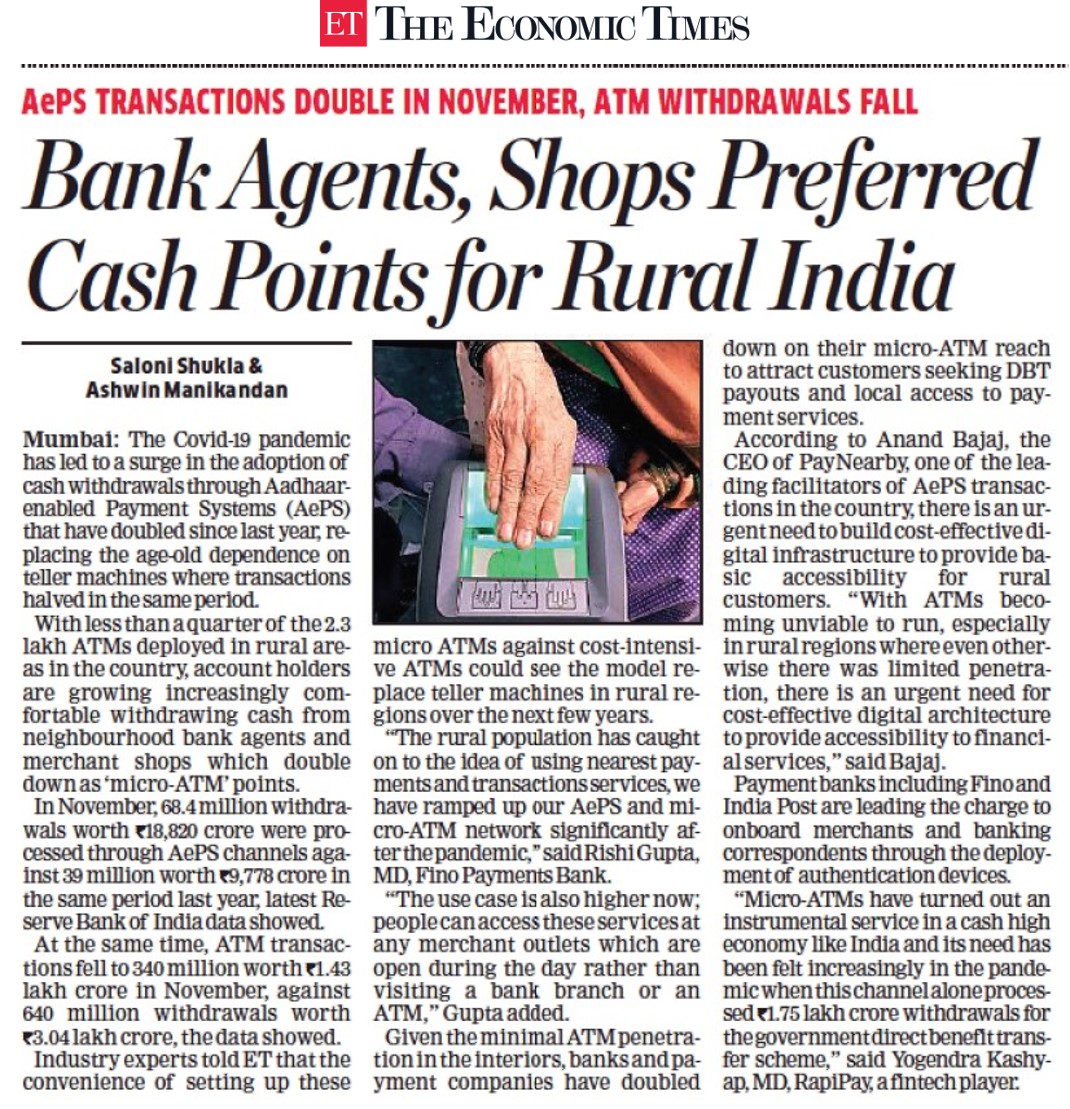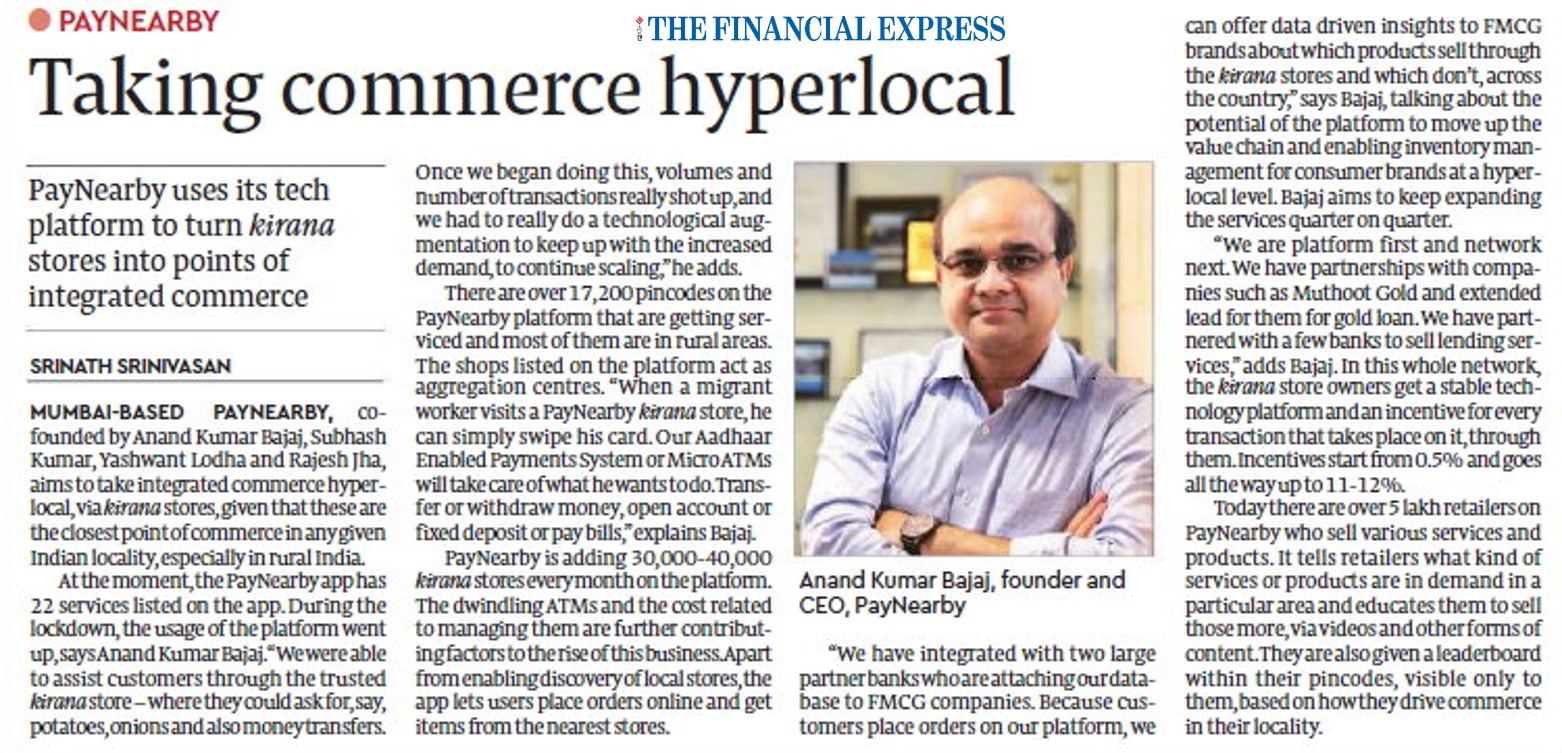Pandemic amplified the need for contactless payments to reduce transmission risk
The fintech industry wants continued focus and sector-friendly policies to be implemented to boost more participation in this sector, especially for the business correspondent (BC) industry, which is truly the poor man’s network and plays a pivotal role in ensuring financial access. “The fintech industry of the country hopes to see continued focus and sector-friendly policies,” Anand Kumar Bajaj, Founder, Managing Director and CEO, PayNearby, tells Bizz Buzz
How has been the journey of fintech companies in India so far?
Fintech companies have come a long way in the country over the past few years. Post demonetisation, there has been a radical rise in the number of fintech startups in the country, especially in the payments sector. With the success of AePS, UPI and P2P payments, there has been a rise in digital banking and app-based services. Collaborations between incumbents and technology disruptors have completely changed how financial services are delivered and integrated into everyday experiences. Examples of numerous use cases enabled by these rapid advancements include paymenttech, insuretech, robo advisory, data visualisation, lendtech for thin file customers and financial discovery platforms.
Rapid advancements in financial technology, together with rising collaboration between banks and new-age startups have the potential to bridge the digital and financial divide that exists in the country and create a stronger India. By democratising and satchetising products into consumable experience, fintech startups are universalising banking services among the masses and creating long-term sustainable financial models. It is now seen as a sector that is making the impossible possible.
The pandemic has made 2020 an unprecedented year and has boosted prospects for the fintech players in every aspect of life. How do you see it in terms of business facilitation? What is the way forward, present challenges and demands from the government and the RBI?
Covid-19 may have severely impacted businesses worldwide. With restricted mobility, there has been a major thrust towards digitisation globally. The pandemic has amplified the need for contactless payments to reduce the risk of transmission. This has given a major boost to digital payment adoption in the country and is also helping in promoting new form factors and experiences in this sector. With wide-scale restructuring in most sectors, and businesses and consumers going online, the only way forward for digital payment industry from here is northwards. As it propels towards growth, what needs to be kept in mind is that we put the right firewalls and security measures in place that protects the interest of consumers.
With ATMs becoming unviable to run in many parts of the country, especially in rural regions where even otherwise there was limited penetration, there is an urgent need for cost-effective digital architecture to provide accessibility to financial services. Branchless banking has seen a significant rise since the lockdown. One cannot ignore the role of Aadhaar banking in disbursal of DBT (direct benefit transfer) funds to masses during the pandemic, led massively by the tireless effort put in by the agent banking network.
The existing geographical challenges which have aggravated further in the wake of the pandemic has impeded accessibility to financial services in many areas, and this is where agent banking or business correspondents stepped in. They played a pivotal role in ensuring that the last mile had access to resources to tide this pandemic. In a country where there are less than 18 ATMs per lakh people, there is an immediate need to multiply business correspondents’ network multifold. So, it is imperative that we have enough support system for the BC industry so that they are viable and have the motivation and resources to execute their critical role in these difficult times.
On the technology side, there is a need for robust mechanisms that use tools like data science, artificial intelligence, blockchain and machine learning to fortify transaction security that can pave the way for true digital transformation. Additionally, regulatory bodies are now focusing on methods to bring rural India into the digital fold through innovative form factors.
As India moves towards a rapid digital growth, PayNearby is committed to simplifying high-end technology for the bottom of the pyramid, so that benefits of digital payments and digital banking can reach the masses. We are focused on creating form factor-agnostic digital payment solutions, available at over 10 lakh nearby outlets, so that there is a solution for every customer need. We want to ensure essential banking services are available for every citizen in the country at a store nearby, and the gap between Bharat and India can be bridged once and for all.
RBI has proposed a full-fledged separate division for the fintech players. How do you see it? What kind of dialogue are you having with the regulator and bankers amidst the evolving economic scenario and needs of the present time?
The fintech ecosystem in India has been fortunate enough to have progressive regulators with a strong, undeterred vision to usher in widespread financial inclusion. Over the last few years, RBI has created policies to boost new forms of lending and payment institutions such as mobile wallets, P2P lending and payment banks. It has also been making regulatory changes to encourage digitisation of banking, credit and payment services. Various initiatives such as the Innovation Hub, Regulatory Sandbox, OCEN (Open Credit-Enabled Network) and AA (Account Aggregator) are sure to boost innovation and test the viability of new technologies. Regulatory bodies like NPCI have made India the poster boy of digital payments through the unprecedented success of UPI and its monumental growth has caught the eye of major companies globally, putting India on the map as a digital innovator, rather than just an implementor.
We hope to see continued focus and sector-friendly policies implemented to boost more participation in this sector, especially for the business correspondent industry, which is truly the poor man’s network and plays a pivotal role in ensuring financial access. Friendly taxation policies and booster packages will go a long way in driving more participation in agent banking programs across the country.
How fast is the industry adapting and catering to the growing need of go-digital, a move highly promoted by RBI and the government?
Since the pandemic, we have seen digital payment platforms breaking records with UPI crossing 2 billion transactions a month, almost a 2x growth since last year, with a 135 per cent increase in overall the digital payment usage, especially in rural areas. AePS has also been critical in facilitating access to government relief funds and DBT access and has seen exponential growth during this period. MSMEs, too, have adapted to going digital, with PayNearby being instrumental in bringing kirana stores and local retailers online and helping them be a part of the e-commerce wave. Digitisation has mostly taken off successfully in urban areas, riding on the massive success of UPI and payment apps, but a lack of awareness and digital infrastructure still inhibit the rural sector. A concerted effort to handhold them to adopt digital transactions through agent banking and assisted tools is the key to catalysing this process and bridging the digital divide.


















